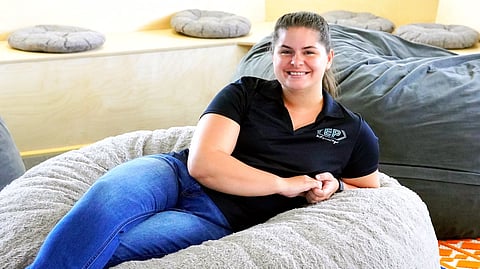
- Home
- Topic Areas
- Newsletter
- Podcast
- 100 Families Initiative
- About
- Connect
- Restore Hope

Billie Jean Mayben’s life could have easily been one of despair and lost potential. Growing up surrounded by addiction, instability, and emotional trauma, she was the embodiment of a young person society might label as “lost.”
Her father cooked meth, her mother struggled with alcoholism, and Billie Jean found herself caught in a cycle of chaos that led to substance abuse at an early age. In her early teens, she was stealing her parents’ drugs and falling in with the wrong crowd, eventually trying meth on her 17th birthday and spiraling into intravenous drug use.
“I was passed from household to household and went through all kinds of psychiatric treatment,” she recalls. “I was definitely the person they said would never recover.”
The reality of Billie Jean’s life was harsh. She was homeless at times, choosing life under a bridge over remaining in a toxic home environment. She broke into abandoned houses just to have a place to sleep. Her grades in school plummeted, yet no one stopped to ask the crucial question: “What’s really going on?”
Despite attempts at recovery, no comprehensive help was available to address the underlying issues that fueled her addiction.
It wasn’t until Billie Jean finally entered a rehabilitation program that she began to rebuild her life. A year into sobriety, she discovered a potential new path: peer support. Peer support for substance abuse recovery is a form of support in which individuals who have experienced and overcome substance use disorder themselves provide guidance, encouragement, and practical assistance to those currently going through recovery.
Peer support specialists use their own lived experiences to help others navigate the challenges of recovery, offering understanding, hope, and the trust and connection that develops over shared experiences.
“I learned about peer support and realized it was about empowering people and learning different pathways to recovery. It felt like my calling,”she said.
With determination, she completed the required professional training and began working with adults trying to recover from substance abuse. But when that program ended, a new opportunity emerged—one that would allow her to leverage her past to create change in the lives of young people.
Billie Jean joined the Youth Empowerment Project (YEP) at the Wolfe Street Foundation in Little Rock, the first youth-specific recovery initiative of its kind in Arkansas. The YEP program takes a holistic approach to recovery. It not only addresses substance use but also supports mental health and educational goals.
Billie Jean’s work involves one-on-one sessions where she helps young people set goals and access resources to overcome obstacles, like lack of transportation or unstable home environments.
One particular case stands out for Billie Jean. “We have a peer who has 13 brothers and sisters and was just pulled out of school. His father is in the system. We’ve been able to set goals and connect him with resources, and he’s made a commitment to get his GED.”
This approach is making a difference. “You just see the light coming on,” Billie Jean says. “They start to realize, ‘I can get out of this situation, and I can do it by taking these steps for myself.’”
Related Story:
Peer support recognizes that youth need more than traditional support services; they need caring adults who have walked a similar path and can inspire them to take control of their lives.
“Growing up, I didn’t know that anything was off,” Billie Jean reflects. “I thought every kid lived like this. If I could have ended up in a place like YEP, with the support it offers, it could have made a huge difference.”
The Youth Empowerment Project is the beginning of a new era for youth recovery in Arkansas. It is supported by partnerships that recognize no single organization can do it alone. YEP collaborates with community partners to ensure that youth can access transportation, mental health care, and other critical services.
“We're trailblazing a path for what peer support for youth looks like in Arkansas," says Billie Jean.
The program’s unique approach extends beyond the typical age cutoffs, continuing to support youth even after they turn 18. This is vital, as many programs end support at adulthood, leaving young people without the resources they still need.
Billie Jean Mayben’s work at YEP isn’t just about helping youth overcome substance abuse; it’s about showing them that they can choose a different path, just as she did.
“I thought I wasn’t good at anything. It took a while for me to feel like I had any self-worth,” she admits. But today, as she stands beside young people in their struggles, Billie Jean is more than just a survivor—she represents hope.
Related Stories:
Smart Justice is a magazine, podcast, and continuing news coverage from the nonprofit Restore Hope and covers the pursuit of better outcomes on justice system-related issues, such as child welfare, incarceration, and juvenile justice. Our coverage is solutions-oriented, focusing on the innovative ways in which communities are solving issues and the lessons that have been learned as a result of successes and challenges.
The podcast is available on all major podcasting platforms.
Subscribe to the Smart Justice newsletter.
